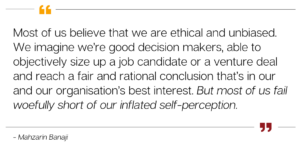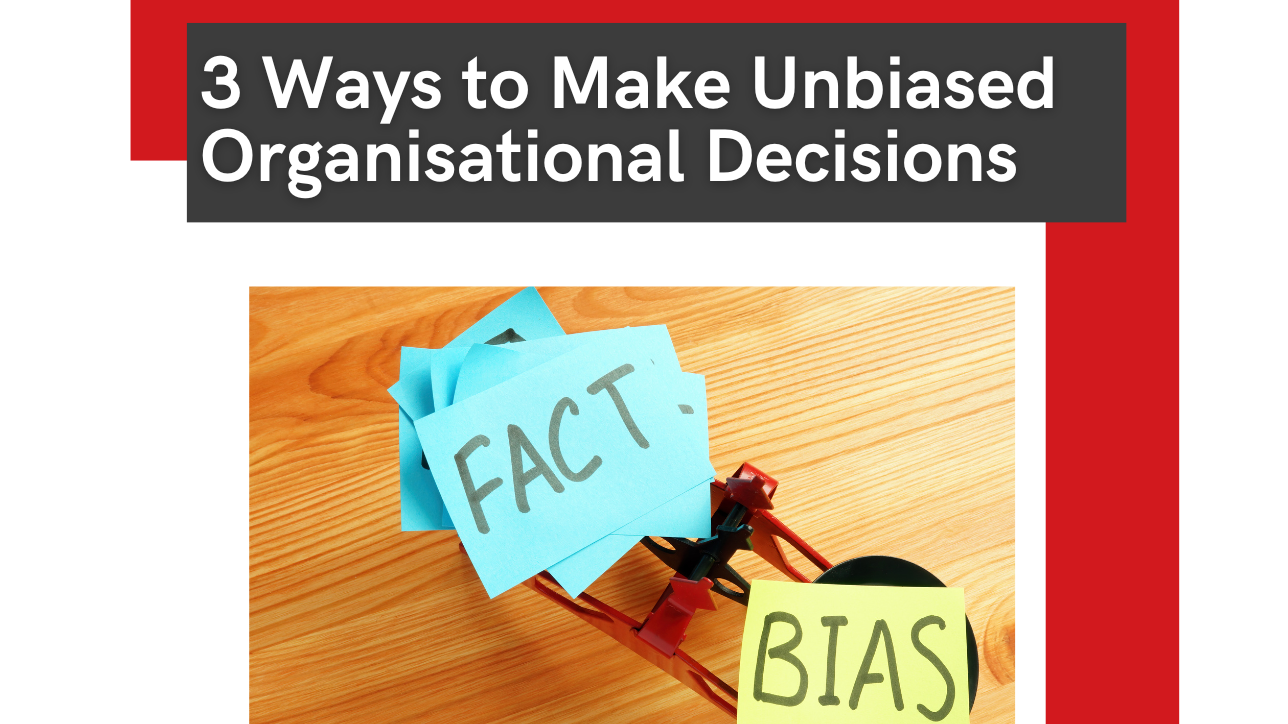4 Minute Read
Takeaway: Decision-making processes, whether in someone’s mind or an actual decision tree, usually consist of some sort of data-gathering. But somehow our human factor takes over, regardless of how many data points are on the table…
Bias is nothing more than a pair of glasses through which we view the world – based on our identity and life experiences. Most of our existing biases are those we are unaware of. The relationship between bias and decision-making has been researched, especially in the context of decisions made in organisations (Cox, et al, 2017). As important as it is to understand those dynamics, this piece focuses on the practical how of making unbiased decisions.
Decisions, Decisions, D e c i s i o n s
Just the way the three words of decisions have been written above are different – same word, different possible perceptions. Decisions about people, processes, and strategic direction – to name three – are made daily in organisations. Decision-making processes, whether in someone’s mind or an actual decision tree, usually consist of some sort of data-gathering. But somehow our human factor takes over, regardless of how many data points are on the table. Our human factor coupled with the degree of uncertainty organisations continuously face, increases the risks that come with decision-making.
I know what you’re thinking: ‘decision-making is risk-taking– so, what does that have to do with biases?
Unconscious bias increases risk-taking because it distorts our perception. Consequently, this causes an over-reliance on a part of the truth while disregarding contradictory information. Think: similarity bias (like preference over difference), expedience bias (prefer quickly over thorough), distance bias (dislike what’s farther away), and safety bias (protecting loss more than risk gain).
Now, factor that in with what Harvard University researcher, Mahzarin Banaji wrote:

This quote offers some food for thought when making decisions; in fact, it offers an honest point on how you can move ahead.
Ok, Let’s Keep it Real: Actions
- Breathe and ask why (why, why, why, and why?)
Quite literally, just breathe. There are probably lots of valid reasons why you need to rush into that very important strategic decision. Yet, taking it slow will do more good than harm, when it comes to decision-making. So, keep asking ‘why’ throughout the process to eradicate assumptions. Asking why five times gives clearer insight on what the problem and the solution (aka decision) should be. - Get your data to speak without confirming biases
Get clean data and crunch it to spot patterns and understand them prior to making a break-the-cycle decision. But be wary to not solely rely on tech spitting out transformed data into 100% correct information. This information still needs to be carefully interpreted and can even be used to confirm biases – which is undesirable. So, while data is a crucial part of decision-making, we must still be wary of it. - Eeney meeney miney moe: whats prio?
Fortunately, not all decisions are equally important. Most organisations have some sort of (legal) governance mechanism in place that dictates what decisions need to be made in relation to what scenario. Getting a sharp sense of what information is needed to decide, as well as the impact of the decision will help set priorities. Furthermore, prioritising doesn’t mean forgetting. It’s impossible to capture everything at a single point in time. Therefore, it’s useful to work with a ‘car park’ of some sort. This keeps focus on the main topic at hand and allows us to revisit items in the car park relevant at a given point in time.
Some of the most effective developments started with unconscious bias initiatives in organisations. There is no one size fits all, but the aforementioned steps can help drive you in an effective and fair direction. Making a real difference is subject to time, mindset, and consistent actions.
Anissa Oukhiar is a Consultant at ON THE MARK. OTM is a global leader in collaborative operating model modernization that creates real change, fast. OTM’s passion for collaborative business transformation is supported by pragmatism, systems thinking, and a belief in people that is unparalleled for 34 years.


